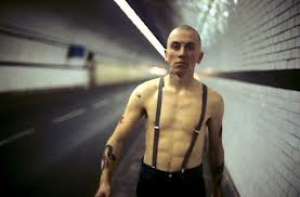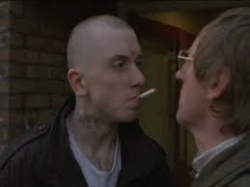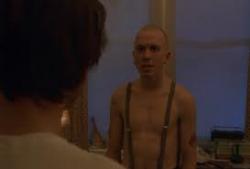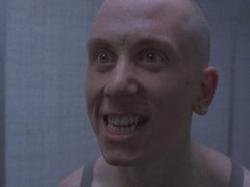Maggie's animal farm
By Johnny Socha
Alan Clarke’s 1982 drama Made in Britain was released as the Thatcher years were beginning to shape the UK landscape and is arguably his finest work.
The film stars Tim Roth in his debut as the skinhead Trevor and for the most part follows his life over a weekend of mayhem. Roth may have been a neophyte to film, but his performance has a visceral rage that belied his years.
Clarke could claim in this film to have moved out of the shadow of his left-wing contemporaries, especially in his depiction of Trevor. From the moment he steps up and glares at camera as he is lead to a courtroom, he snarls, rages and screams at the audience who are never given an easy answer to his enmity. His racism, violence and non-conformity could easily have been understood by a dysfunctional background, a poor education, or an uncaring system. Yet Clarke doesn’t allow these comfortable answers to shape the narrative: we never learn about Trevor’s family, he is extremely articulate and the social workers who attempt to help him are caring, considerate and exhaustively patient. And yet Trevor is pure, unadulterated rebellion.
The movie mirrors Trevor’s uncompromising approach and forces us to look for answers where no easy ones are forthcoming. Clarke even sets up conventional redemptive routes for his protagonist, such as his interest in cars spurring on one of his social workers to allow him to participate in a stock car race, and then confounds his audience’s expectations, with the car breaking down fuelling further resentment on Trevor’s part.
If there is hope, it lies in Trevor’s relationship with his primary social worker – Harry Richard. The few moments they do share together suggest that Trevor views him as something of a surrogate father-figure who appears to keep his behaviour under control. Indeed, the whole explosion of anger that the film depicts appear to be precipitated by Harry taking a much-needed vacation.
Clarke’s direction is as visceral and aggressive as his main character. His camera is in turns restless then static. It twitches to the whim of Roth - uncomfortably close one minute, distant and seething the next. One of the most memorable scenes in the film, show Clarke’s ability to make brave, but necessary choices. After being involved in a violent fracas, Trevor is moved to an isolation room where, after a period of cooling down, the superintendent (Geoffrey Hutchings) arrives. He then proceeds to describe the choices open to Trevor, the road he is going down and how he has ended up where he presently is. It is shot in one long take as Hutchings dispenses advice and caveats with a single blackboard, a stiff finger and a piece of chalk. The scene builds beautifully with the growing nexus of links on the board not only the singular narrative of Trevor, but which also serves as a microcosm for a growing generation of disaffected young people.
In the end, Clarke’s unwillingness to reveal his hand reflects back at us. When we see Trevor our own prejudices and class values fill in the narrative blanks with the result a place we’re not always comfortable to visit, yet Clarke demands we go anyway.




